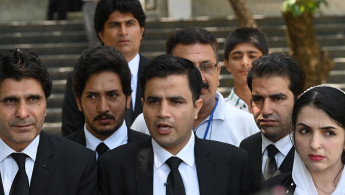Jailed ex-Pakistan PM Imran Khan challenges graft conviction
Pakistan's jailed former Prime Minister Imran Khan appealed against his conviction and three-year sentence on corruption charges on Tuesday, his lawyer said, a ruling which analysts say is likely to fuel political instability.
Naeem Panjutha said the petition challenging the weekend conviction had been filed in Islamabad High Court which will hear the case on Wednesday.
Ex-cricketer Khan, 70, was jailed on charges of selling state gifts unlawfully during his tenure as premier from 2018 to 2022.
Khan has been at the heart of political turmoil since he was ousted as prime minister in a vote of no confidence last year, raising concern about stability in the nuclear-armed country as it grapples with an economic crisis.
The 241-million-population South Asian country in June secured a last-gasp $3 billion deal with the IMF, which has sought a consensus on policy objectives among all political parties ahead of general elections due by November.
A looming threat': In Pakistan, enforced disappearances silence dissent https://t.co/leE8mTVRYO
— The New Arab (@The_NewArab) July 31, 2023
"Being aggrieved and dissatisfied," Khan has appealed to the high court to "set aside" the trial court's order that convicted and sentenced him, according to a copy of the petition posted by Panjutha on social media platform X, formerly Twitter.
Khan's legal team say he is being kept in abject conditions in a small C-class cell in a prison in Attock, near the capital Islamabad, with an open toilet, when he should qualify for a B-class cell with facilities including an attached washroom, newspapers, books and TV.
Interior Minister Rana Sanaullah, who spent several months in jail on drug trafficking charges he says was fabricated during Khan's tenure, said that Khan himself had been a proponent of uniformity in prisons.
"As far as the open washrooms, the jails have got only open washrooms, there are no separate washrooms, and it could be in Khan's knowledge that the cells where we were kept they were also the same," the minister told Geo News TV.
He said Khan could file an application in court that he shouldn't be kept with ordinary inmates.
"Whatever the court decides, it will be implemented and if he wants to have meals from home, he should seek a permission from court," he said.
(Reuters)





 Follow the Middle East's top stories in English at The New Arab on Google News
Follow the Middle East's top stories in English at The New Arab on Google News
![Both Hamas and the Palestinian Authority welcomed the ICC arrest warrants [Getty]](/sites/default/files/styles/image_330x185/public/2024-11/GettyImages-2178351173.jpg?h=199d8c1f&itok=TV858iVg)

